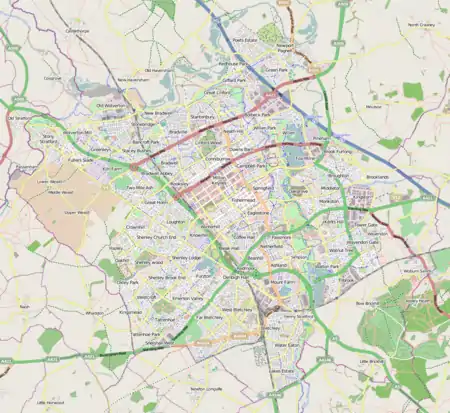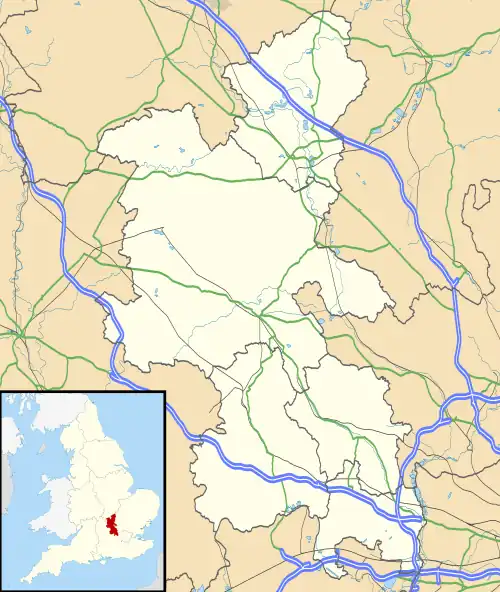| Middleton | |
|---|---|
 All Saints' Church, Milton Keynes Village | |
 Middleton Mapping © OpenStreetMap  Middleton Location within Buckinghamshire | |
| Population | 5,624 (2011 Census, civil parish)[1] |
| OS grid reference | SP888390 |
| Civil parish |
|
| Unitary authority | |
| Ceremonial county | |
| Region | |
| Country | England |
| Sovereign state | United Kingdom |
| Post town | MILTON KEYNES |
| Postcode district | MK10 |
| Dialling code | 01908 |
| Police | Thames Valley |
| Fire | Buckinghamshire |
| Ambulance | South Central |
| UK Parliament | |
Middleton is an area of Milton Keynes, a city in Buckinghamshire, England, and part of the civil parish of Milton Keynes.[lower-alpha 1] Its historic centre is Milton Keynes Village, the village that in 1967 gave its name to the city of which it is now a small part.[2] It is delineated by Childs Way to the north, Tongwell Street to the east, Chaffron Way to the south and Brickhill Street to the west. The River Ouzel runs diagonally through it, from west to north.
History

The village was originally known as Middeltone (11th century); then later as Middelton Kaynes or Caynes (13th century); Milton Keynes (15th century); and Milton alias Middelton Gaynes (17th century).[5] After the Norman invasion, the de Cahaines family held the manor from 1166 to the late 13th century as well as others in the country (Ashton Keynes in Wiltshire, Somerford Keynes in Gloucestershire, and Horsted Keynes in West Sussex). During this time the village became known as Middleton Keynes [3] eventually shortening to 'Milton Keynes'.[6]
The original core village of the district, along Walton Road and Broughton Road, has retained its "Milton Keynes" road signs and has several rural village houses and a thatched pub which dates back to the 13th century. It is now known as "Milton Keynes Village".
Education
Middleton has two schools, Middleton Primary School and Oakgrove School, a secondary comprehensive. Both were built in the early 2000s, in the southwest of the district.
Civil parish
Early in the development of Milton Keynes (the city), the area surrounding Milton Keynes (the village) was given the name Middleton again. However, the civil parish is still called Milton Keynes,[7] and has a joint parish council with Broughton, called Broughton and Milton Keynes Parish Council.[8] Milton Keynes civil parish consists of Middleton and the neighbouring grid-squares of Oakgrove, Fox Milne and Pineham.[1] (The city centre has its own civil parish, called "Central Milton Keynes".)
Notes
- ↑ So Milton Keynes (the village) is in Middleton (the grid square), which is in Milton Keynes (the civil parish), which is one of a number in Milton Keynes (the city), which in turn is in the City of Milton Keynes unitary authority district.
- ↑ However, the names "Mydilton Keynes" and "Milton Keynes" appear on the same membrane of the Plea Roll, CP40/764, dated 1452.[4]
References
- 1 2 UK Census (2011). "Local Area Report – Milton Keynes (E04001263)". Nomis. Office for National Statistics. Retrieved 19 November 2019.
- ↑ Dave Persaud. "Father of the New City: Lord Campbell of Eskan, first Chair of Milton Keynes Development Corporation". Milton Keynes: Living Archive.
Labour Minister Dick Crossman who "…looked at [a] map and saw [the] name and said 'Milton the poet, Keynes the economic one. Planning with economic sense and idealism, a very good name for it.'"
- 1 2 "Plea Rolls of the Court of Common Pleas; 1461 (CP40/800)". Anglo-American Legal Tradition. University of Houston. 1461. Archived from the original on 31 January 2022. Retrieved 31 January 2022. See last paragraph, at the start of line 5, "Middelton Keynes"
- ↑ first entry: Richard Kent; http://aalt.law.uh.edu/AALT3/H6/CP40no764/aCP40no764fronts/IMG_0938.htm ; and last entry on http://aalt.law.uh.edu/AALT3/H6/CP40no764/aCP40no764fronts/IMG_0939.htm
- ↑ "Parishes : Milton Keynes". A History of the County of Buckingham. Victoria History of the Counties of England. Vol. 4. Constable & Co. Ltd. 1927. pp. 401–405.
- ↑ Woodfield, Paul (1986). A guide to the historic buildings of Milton Keynes. Milton Keynes: Milton Keynes Development Corporation. ISBN 978-0903379052.
- ↑ Sheet 192 Buckingham and Milton Keynes (Map). 1:25000. Ordnance Survey – via Streetmap.co.uk.
- ↑ "Parish Boundary and Parish Wards" (PDF). Milton Keynes City Council. 2 April 2019.
External links